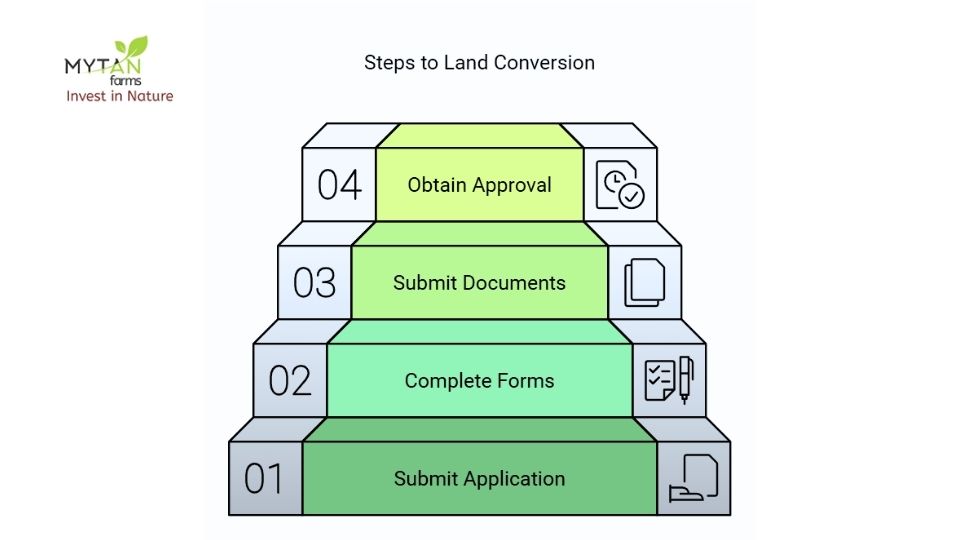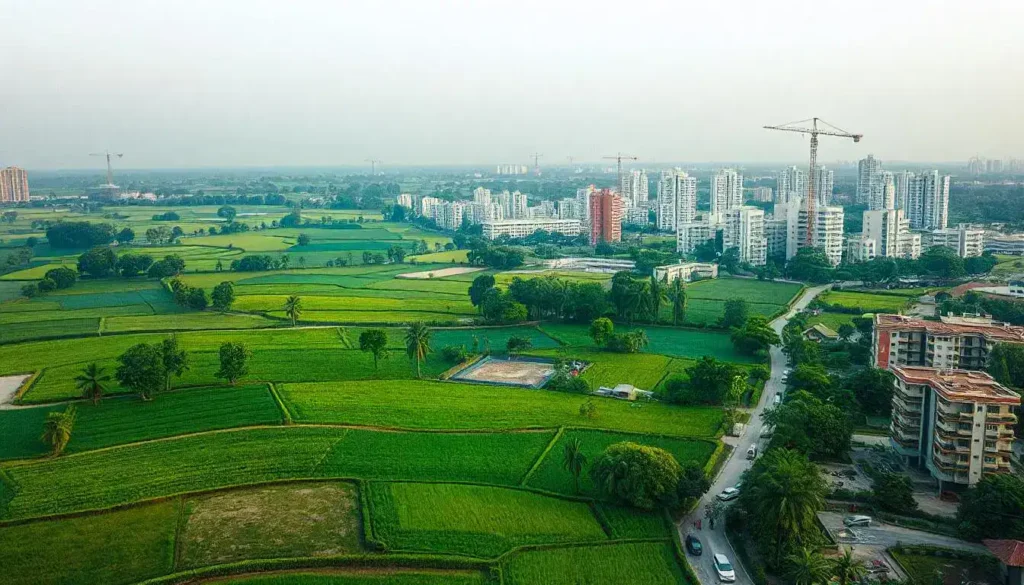
Of course, fast-paced urbanisation and industrialisation have increased the demand for commercial land. Cities like Bengaluru, Mysuru, and Hubballi have rapidly grown and have new business/infrastructure projects and home construction landscapes.
For all agricultural land owners and investors, developing commercial land outside agriculture is an attractive opportunity to unlock significant economic potential.
Whether you are a real estate developer, investor, or entrepreneur, understanding how to legalise land conversion shall help you make better decisions.
This blog will explain the step-by-step process and legal requirements for converting lands in Karnataka, India.
What is land conversion?
Land conversion is the process of changing the classification of land from one type of use to another. In this context, it refers to converting agricultural land into commercial land to enable the construction of business establishments, offices, retail spaces, or other commercial purposes.
Role of deputy commissioner
The district’s Deputy Commissioner (DC) regulates the land conversion process in Karnataka. Often referred to as DC conversion, this step is critical because it officially changes the land’s use category in government records.
Without proper DC approval, any commercial development on agricultural land is deemed illegal and subject to penalties or even demolition.
Legal context
The Karnataka Land Revenue Act will govern land conversion, so the owners will have to go through the process. It will save a lot of court litigation and provide a clean and clear title to the buyer/investor.
Step-by-Step Procedure for Land Conversion in Karnataka

Step 1: Submit your application
The first step involves submitting an application to the Commissioner of the Land Revenue Department or the district Tahsildar’s office. The application should include essential details such as:
- The purpose of conversion (e.g., setting up a commercial complex).
- The extent of the land in question.
- Ownership history to establish clear title records.
- Soil type classification determines whether the land is suitable for conversion.
Land declared by any competent authority as agricultural land cannot be used for residential, commercial, or industrial purposes unless it is converted into non-agricultural land.
Now, the process by which agro land is converted into non-ago land is termed land conversion, or in other words, DC Conversion; the latter name is enforced because the conversion process is supposed to be generally endorsed by a Deputy Commissioner.
Land conversion in India differs from State to State because it is under the State Government’s power.
Step 2: Required Forms and Their Usage
Depending on the type of land, specific forms must be used:
- Form 1: Applicable for land reform tenanted lands.
- Form 21: Used for Patta lands, which are privately owned.
These forms must be filled out and submitted to the Tahsildar’s office along with the application. Ensure that all sections are correctly completed to avoid rejections or delays.
Step 3: Submit your documents
According to Indiafilings, you need to submit the following documents to convert your agricultural land into commercial land:
- ID proof of Khata certificate
- Mutation letter
- Original sale deed or gift partition deed
- Property Title Deed
- No Objection Certificate (NOC) of the village accountant
- Latest receipt of the tax deposit
- Certified survey map
- Records of Rights and Tenancy Certificate (RTC)
- Certified copy of the Land Tribunal Order
- A certified copy of Form 10 that certifies the rights of occupancy
- Zonal certificate from Urban Development Authority
- Photocopy of the atlas of the land
- Photocopy of the revenue survey map of the village
Step 4: Get approval
Once the application and documents are submitted, the Deputy Commissioner will review the request.
The land must comply with the Comprehensive Development Plan (CDP), which outlines zonal classifications and permissible land uses.
If the land meets all requirements, the DC will grant approval, officially converting the land’s status from agricultural to commercial.
Key Requirements for Successful Conversion
Compliance with the Comprehensive Development Plan (CDP)
The CDP is a master plan that outlines zoning regulations across various regions. Ensuring your land fits into a designated commercial zone is crucial for successful conversion.
Zonal Restrictions
Before applying, verify if the land is in a zone where commercial use is permitted. Attempting to convert land in a restricted area can result in rejection or legal action.
Avoiding Litigation and Outstanding Dues
A clean property record with no legal disputes or unpaid taxes significantly improves your chances of approval. Clear all pending dues and resolve any litigation before initiating the conversion process.
Challenges and Common Pitfalls in Land Conversion
While the process may seem straightforward, applicants often face challenges:
Incomplete Documentation
The main cause of a delay is usually incomplete or incorrect documentation. Submitting only all the necessary documents in the proper format should prevent this.
Zonal mismatches
If the land does not conform to the conditions of the CDP zoning rules, it may not be accepted. Therefore, the significance of verifying proper zoning before submission arises.
Legal and Financial Risks
Proper approval is required to prevent landowners from significant legal risks, including penalties and potential demolition of unauthorised structures. Additionally, financial losses may occur due to halted projects or investor withdrawals.
Post-Conversion Responsibilities
Once the land is converted, landowners and developers must adhere to the approved usage and comply with all applicable regulations.
Adherence to Approved Use
It’s essential to maintain the land’s designated use. For example, if land is converted for commercial purposes, constructing residential buildings could result in fines or demolition orders.
Role of Buyers
Buyers should thoroughly verify that the land has been legally converted and that all necessary approvals are in place. This includes checking the DC conversion certificate and ensuring the land complies with local development plans.
Compliance Checks
Local authorities regularly conduct compliance checks to ensure that the land is being used as approved, reducing the risk of penalties.
Why Choose Karnataka for Land Conversion Opportunities?

Karnataka is very attractive in terms of its economic growth and investor-friendly policies. The development of infrastructure is ongoing here.
Cities like Bengaluru and Mysuru hold great prospects for commercial developments, mainly due to their IT and industrial booms.
Some areas have high potential for commercial development. Regions around Bengaluru’s outskirts, Mangaluru and Hubballi-Dharwad, are experiencing rapid growth, making them ideal for future commercial projects.
Expanding road networks, metro connectivity, and government support for new businesses benefit these areas.
Tips for Smooth Land Conversion
Engage with Legal Consultants and Property Advisors
Experienced professionals can guide you through complex procedures and ensure compliance with all legal requirements, reducing the risk of errors.
Their experience and contacts will save you from any illegal work or unnecessary obligations in the future. They will also make sure that each and every process is as smooth as possible.
Verify Land Records Thoroughly
Double-check land records with local authorities to confirm ownership and zoning classifications. This minimises the likelihood of disputes or application rejections.
Take help from professionals
In general, dealing with government procedures is challenging since they involve a lot of time and can sometimes be puzzling. It is, therefore, important to seek the services of experts in land conversion so that you can handle some of the loops you may be taking.
Mytan Farms as Your Partner in Land Investments
For those seeking expert guidance, Mytanfarms offers comprehensive support for land investments in Karnataka.
With deep knowledge of the land conversion process, Mytanfarms can help investors identify agricultural land with high conversion potential, ensuring a smooth and profitable transition.
Mytan Farms specializes in managed farmlands, offering eco-friendly farmland investment options and tailored solutions for investors exploring the conversion of agricultural land into commercial properties
Whether you’re a first-time buyer or a seasoned investor, Mytanfarms provides the expertise needed to navigate the complex land conversion process, ensuring compliance and profitability.

Conclusion
The conversion of agricultural land to commercial in Karnataka can play a game-changer role for many landowners and investors. With proper follow-up of the procedures and expert professionals, you could easily unlock high economic potential in Karnataka’s thriving economy with supportive policies.
Ready to move another step forward? Partner with Mytan Farms for information-driven land investment decisions and easy conversion process access.
FAQs
What is the role of the Deputy Commissioner in land conversion?
The Deputy Commissioner oversees the approval process, ensuring that land conversion requests comply with zoning and legal requirements.
Which documents are required for land conversion in Karnataka?
Key documents include identity proof, property title deed, RTC records, NOC from the village accountant, and tax receipts.
Why is compliance with the Comprehensive Development Plan (CDP) important?
Compliance ensures that the land fits the designated zoning regulations, reducing the risk of application rejection and legal issues.




